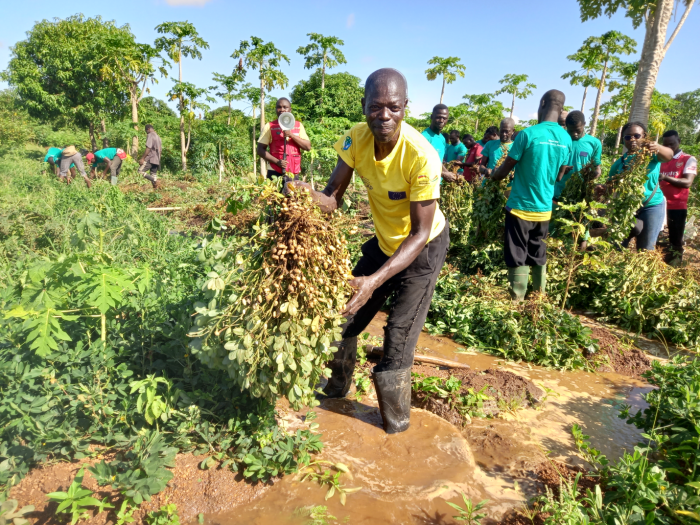
In Northern Ghana, about 80% of the population are farmers who primarily rely on rainfall to irrigate their fields. Unfortunately, the region's rainfall only lasts for five to six months, rendering a large number of farmers unable to cultivate their land for the following six to seven months. In the midst of this challenge, and with most farmers changing their careers or seeking short-term work elsewhere, a few farmers continue to grow food through dry-season gardening.
Dry-season gardening is typically done on a smaller scale than wet- or rainy-season farming, hence the term "gardening" instead of "farming." It is mainly practiced in areas near a water source, where water is accessible even during the driest months and focuses on cultivating high-value vegetables and leafy greens.
Unlike vegetables and fruits grown at this time of year, groundnut produced towards the end of the dry season coincides with peak demand for groundnut seed, so seed growers can tap a ready market. In addition, the groundnut crop residues provide a good source of income to farmers at a time when the price of fodder is at its highest. Finally, growing groundnuts in the dry season could be a breakthrough in ongoing efforts to significantly reduce aflatoxin contamination since fungi do not thrive well at lower humidity.
In AFC's support to the Market Oriented Agricultural Progamme in North-West Ghana, which is implemented by GIZ with co-financing from the European Union, dry-season groundnut production has been identified as a potential activity that could increase farming households' income. Farmers have been equipped with the skills to farm groundnuts with irrigation in the dry season, with the expectation that it could provide additional dry-season employment for groundnut value chain actors. In this context, the use of energy-efficient solar irrigation pumps is being promoted.
In order to test the viability of this production system, a trial of dry-season groundnut production using cost-effective and environmentally friendly solar pumps (“Future pump SF1 Model”) was conducted in 2023. The Futurepump SE1 is a surface water pump suitable for irrigating up to 1 acre of land, delivering up to 0.5 litres of water per second. Fifteen farmers were selected to participate, based on their prior knowledge about or interest in dry-season gardening. AFC has provided support like technical assistance, seeds, inoculants, fertilizer, solar irrigation pumps, sacks and farm labor. Also, a field day was organized in July to showcase the dry-season groundnut fields.
The results of this trial have been very promising. The achieved yield of almost 3 tons per hectare far surpasses the current national average yield of 1.84 tons for groundnuts in Ghana. Apart from the good agricultural practices (GAPs) that were applied during the trial, this high yield can be particularly attributed to the constant supply of water. Also, the lower prevalence of pests and diseases in the dry season had a positive effect. In this context, the application of Neem seed oil as a biological pest control measure proved to be very effective for such soil-based pests as ants and grubs.
Considering all relevant production factors, the revenue generated per hectare was more than double to the cost of production. The aflatoxin test results for production samples was low, showing that dry-season groundnut production could be the key to the fight against aflatoxin contamination. While the initial cost of purchasing the SF1 solar pump is higher and its water output lower than the gasoline pumps that are popular among dry-season farmers in the northern Ghana, it has proven to be cost-effective in the long run. However, the mobilization of the initial higher investment costs remains a challenge for many small-scale farmers.
All in all, the results obtained from this trial are an indication that dry-season groundnut production holds great potential and could offer farmers better yields and higher income. In 2024, we would like to develop this activity further, by starting earlier and staggering planting dates for the trial during the dry season, with a view to determining the best planting date for dry season irrigated groundnuts. We will continue to work with the same farmers, which are enthusiastic about the SF1 FuturePump and interested to cost-share their future procurement.
For further information, please contact matthias.webendoerfer [at] afci.de
